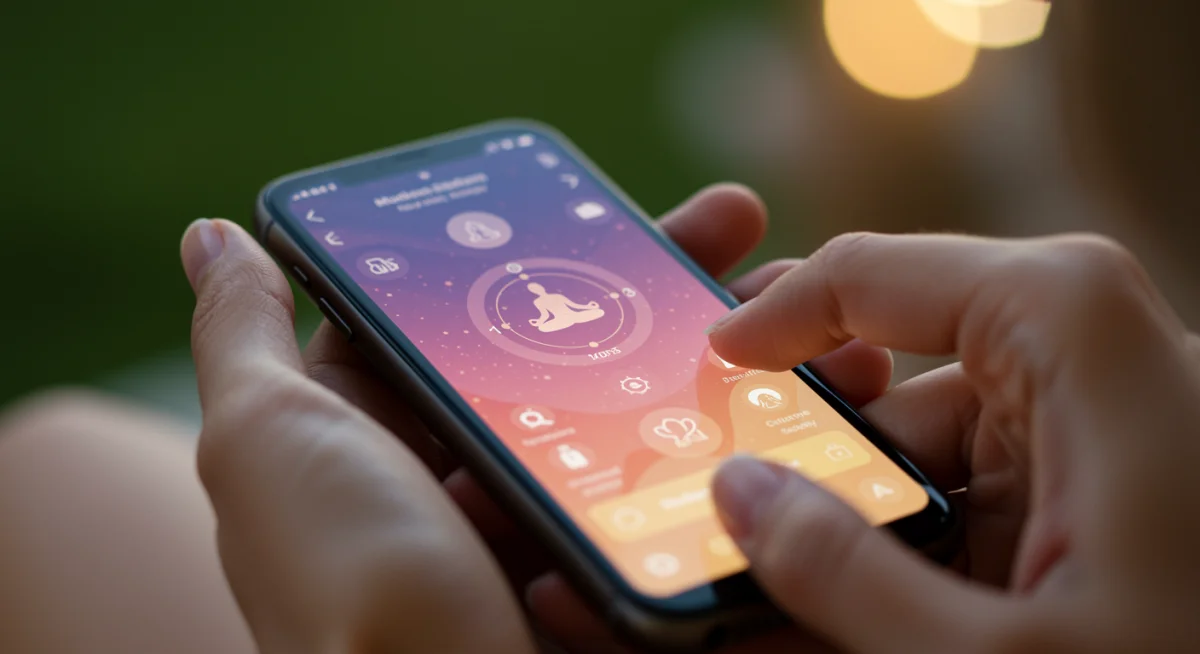Therapist-Recommended Mental Health Apps 2025 US

Therapists in the US are increasingly recommending digital tools to complement traditional care, with specific mental health apps proving invaluable for patient support and progress in 2025.
In an evolving landscape where mental well-being is increasingly prioritized, understanding which digital tools genuinely support therapeutic goals is crucial. This article delves into Expert Insights: The Top 10 Mental Health Apps Recommended by Therapists in the US for 2025 (INSIDER KNOWLEDGE), offering a comprehensive look at the applications making a tangible difference in patient care and personal growth.
The Rise of Digital Mental Wellness Tools
The integration of technology into mental health care has accelerated dramatically, transforming how individuals access support and manage their well-being. Digital mental wellness tools, particularly mobile applications, have become indispensable extensions of traditional therapy, offering accessible, on-demand resources for a wide range of needs. These platforms are not merely trends; they represent a significant shift towards more integrated and personalized mental health solutions, bridging gaps in accessibility and providing continuous support beyond the therapist’s office.
Therapists across the United States are increasingly recognizing the value of these apps, incorporating them into treatment plans to reinforce skills learned in sessions, track progress, and provide immediate coping mechanisms. The effectiveness of these tools lies in their ability to offer structured exercises, educational content, and self-monitoring features that empower users to take an active role in their mental health journey. From cognitive behavioral therapy (CBT) exercises to mindfulness meditations, the diversity of offerings caters to various therapeutic approaches and individual preferences, making mental health support more dynamic and engaging.
Why Therapists Endorse Mental Health Apps
Therapists recommend mental health apps for several compelling reasons. Firstly, these apps extend the reach of therapeutic interventions, allowing clients to practice skills and access support between sessions. This continuous engagement can significantly enhance treatment outcomes. Secondly, many apps are designed with evidence-based principles, offering structured programs that complement formal therapy. Thirdly, they provide a discreet and convenient way for individuals to manage their mental health, reducing barriers such as stigma or geographical limitations.
- Accessibility: Apps offer 24/7 access to support and resources, breaking down barriers of time and location.
- Skill Reinforcement: They provide practical exercises to practice coping mechanisms and therapeutic techniques learned in sessions.
- Data Tracking: Many apps allow users to track moods, symptoms, and progress, offering valuable insights for both clients and therapists.
- Cost-Effectiveness: While some apps require subscriptions, they often present a more affordable alternative or supplement to traditional therapy.
The discerning use of these digital tools, however, is paramount. Therapists emphasize the importance of selecting apps that align with a client’s specific needs and are backed by credible psychological principles. This careful selection ensures that the digital support truly enhances, rather than detracts from, the overall mental wellness strategy. The landscape of mental health apps is vast, making expert guidance invaluable in navigating the options to find genuinely effective resources.
Criteria for Therapist Recommendations
When therapists recommend mental health apps, their choices are far from arbitrary. A rigorous set of criteria guides their selections, ensuring that the tools they suggest are not only user-friendly but also clinically sound and ethically responsible. This meticulous evaluation process underscores their commitment to providing the best possible support for their clients. Understanding these criteria offers valuable insight into what makes an app truly effective and trustworthy in the realm of mental health.
One of the primary considerations is the app’s foundation in evidence-based practices. Therapists prioritize applications that are built upon established psychological theories and interventions, such as Cognitive Behavioral Therapy (CBT), Dialectical Behavior Therapy (DBT), or mindfulness-based stress reduction (MBSR). This ensures that the techniques and exercises offered within the app have been scientifically validated for their efficacy. Without this empirical backing, an app, no matter how appealing, may lack the therapeutic impact necessary for meaningful change.
Key Evaluation Metrics for Digital Tools
Beyond clinical efficacy, several other factors play a crucial role in a therapist’s recommendation. User experience is paramount; an app must be intuitive, engaging, and easy to navigate to encourage consistent use. Privacy and data security are also non-negotiable, given the sensitive nature of mental health information. Therapists must be confident that their clients’ data is protected and handled with the utmost confidentiality. Furthermore, the app’s ability to integrate with or complement ongoing therapy, rather than replace it, is a significant advantage.
- Evidence-Based Foundation: Apps must utilize techniques rooted in established psychological research and therapeutic approaches.
- User Engagement & Design: Intuitive interface, engaging content, and ease of use are critical for sustained user interaction.
- Privacy & Security: Robust data protection policies and HIPAA compliance (where applicable) are essential for sensitive health information.
- Customization & Personalization: The ability to tailor content and exercises to individual needs enhances relevance and effectiveness.
- Therapeutic Alignment: Apps should support and enhance, not replace, the therapeutic process, ideally offering features for progress tracking shared with a therapist.
The ongoing development and updates of an app also signal its reliability. Therapists look for platforms that are regularly maintained, updated with new content, and responsive to user feedback. This demonstrates a commitment to continuous improvement and clinical relevance. Ultimately, a therapist’s recommendation is a testament to an app’s comprehensive value, balancing clinical rigor with practical usability and ethical considerations to truly benefit the user’s mental health journey.
Top 10 Mental Health Apps: An In-Depth Look
Navigating the vast ocean of mental health applications can be daunting, but with expert guidance, finding the right tools becomes much clearer. The following section provides an in-depth exploration of the top 10 mental health apps highly recommended by therapists in the US for 2025. Each app offers unique features and addresses specific aspects of mental well-being, making them valuable adjuncts to professional care.
These apps represent a curated selection, chosen for their adherence to evidence-based practices, user-friendly interfaces, strong privacy policies, and demonstrable impact on users’ mental health. From managing anxiety and depression to fostering mindfulness and improving sleep, these digital companions offer structured support and personalized experiences designed to empower individuals in their wellness journey. Understanding the strengths of each app can help both clients and therapists make informed decisions.
Featured Applications and Their Core Strengths
Let’s dive into the specifics of these highly-regarded applications, highlighting what makes each stand out in the crowded digital mental health space. Each app brings a distinct approach to mental wellness, catering to different needs and preferences, all while maintaining a high standard of therapeutic support.
- Calm: Renowned for its extensive library of guided meditations, sleep stories, and breathing exercises. Therapists often recommend Calm for stress reduction, improving sleep quality, and fostering mindfulness. Its gentle approach makes it suitable for beginners and experienced meditators alike.
- Headspace: Similar to Calm, Headspace offers guided meditations, but with a focus on teaching mindfulness techniques for everyday life. Its structured courses are particularly beneficial for addressing anxiety, stress, and enhancing focus. The app’s engaging animations and clear instructions make complex concepts accessible.
- MoodGYM: An interactive web program (also available as an app) based on Cognitive Behavioral Therapy (CBT). It helps users identify and overcome problematic thought patterns associated with depression and anxiety. Therapists value its structured, educational approach to skill-building.
- Sanvello: Offers on-demand support for stress, anxiety, and depression using CBT and mindfulness techniques. It includes guided meditations, mood tracking, coping tools, and peer support communities. Its comprehensive nature makes it a versatile tool for various mental health challenges.
- Talkspace / BetterHelp: While primarily teletherapy platforms connecting users with licensed therapists, these apps also offer supplementary tools like journaling, goal setting, and educational content. They are invaluable for providing accessible professional support, acting as a complete mental health ecosystem.

Continuing our exploration, the next set of apps focuses on specialized areas or offer unique functionalities that make them stand out in therapist recommendations. These tools underscore the diversity of digital support available, ensuring that individuals can find resources tailored to their specific needs, from managing specific conditions to enhancing daily emotional regulation.
- Woebot: An AI-powered chatbot that uses CBT principles to help users manage mood and anxiety. Woebot engages users in conversational therapy, offering practical exercises and insights. Its conversational interface makes mental health support feel less intimidating and more accessible.
- Happify: Focuses on building resilience and promoting positive emotions through evidence-based games and activities. It aims to reduce stress, overcome negative thoughts, and develop positive habits using principles of positive psychology and CBT.
- Daylio: A simple yet effective mood tracking and journaling app. Users can quickly log their mood and activities without typing, making it easy to identify patterns and triggers. Therapists find it useful for clients to gain insights into their emotional fluctuations.
- CBT-i Coach: Developed by the Department of Veterans Affairs, this app assists individuals in improving sleep quality using Cognitive Behavioral Therapy for Insomnia (CBT-I). It provides tools for sleep scheduling, relaxation, and cognitive restructuring specific to sleep problems.
- PTSD Coach: Also from the VA, this app provides education about PTSD, self-assessment tools, and techniques for managing symptoms like anxiety, anger, and trauma-related thoughts. It’s a critical resource for individuals dealing with post-traumatic stress.
This diverse array of applications highlights the innovative ways technology is being harnessed to support mental wellness. Each app, with its specific focus and evidence-based approach, plays a vital role in providing accessible, effective, and personalized mental health care, making them indispensable tools in a therapist’s arsenal for 2025.
Integrating Apps into Therapeutic Practice
The successful integration of mental health apps into therapeutic practice is not about replacing human connection, but rather about enhancing it. Therapists view these digital tools as powerful complements, extending the reach of their work and empowering clients to engage more actively in their healing journey between sessions. This symbiotic relationship between traditional therapy and digital support creates a more holistic and continuous care model, fostering greater self-awareness and skill development.
For many therapists, introducing apps begins with an assessment of the client’s needs, technological comfort, and therapeutic goals. The recommendation is always personalized, ensuring the chosen app aligns with the individual’s specific challenges and the overall treatment plan. This careful consideration prevents app fatigue and maximizes the likelihood of consistent engagement, ultimately leading to better therapeutic outcomes. The goal is to provide tools that reinforce learned behaviors and offer immediate support when professional guidance isn’t directly available.
Best Practices for App Integration
Effective integration requires more than just suggesting an app; it involves guiding clients on how to use it most effectively and discussing their experiences during sessions. This ongoing dialogue helps therapists understand how the app is impacting their client’s progress and allows for adjustments to be made as needed. It transforms a passive recommendation into an active part of the therapeutic process, making the digital tool an extension of the therapeutic alliance.
- Personalized Recommendations: Match apps to individual client needs, therapeutic goals, and technological literacy.
- Guided Usage: Provide clear instructions and demonstrate how to best utilize the app’s features to maximize benefits.
- Regular Review: Discuss app usage and insights during therapy sessions, integrating data and experiences into ongoing treatment.
- Educate on Limitations: Ensure clients understand that apps are supplementary tools and not a substitute for professional therapy.
- Privacy and Data Awareness: Inform clients about privacy policies and data security practices of recommended apps.
Therapists also play a crucial role in managing expectations, clarifying that while apps can be incredibly helpful, they are not a quick fix. They serve as supportive resources that, when used consistently and thoughtfully, can significantly contribute to long-term mental wellness. This integrated approach leverages the best of both worlds: the personalized, empathetic guidance of a therapist combined with the accessible, structured support of digital technology.
The Future of Digital Mental Health Support
The landscape of mental health support is continually evolving, with digital solutions poised to play an even more prominent role in the years to come. The future of digital mental health is characterized by increasing personalization, advanced AI integration, and a stronger emphasis on preventative care. As technology becomes more sophisticated, so too will the ability of apps to offer highly tailored interventions that adapt to individual user needs and preferences in real-time.
Expect to see greater interoperability between mental health apps and other healthcare platforms, allowing for a more seamless exchange of information and a truly integrated care experience. This will enable therapists and other healthcare providers to gain a more comprehensive understanding of a client’s well-being, facilitating more coordinated and effective treatment plans. The goal is to move towards a system where digital tools are not just standalone aids but integral components of a broader health ecosystem.
Emerging Trends and Innovations
Several exciting trends are shaping the next generation of mental health apps. Artificial intelligence and machine learning are enabling apps to offer more sophisticated insights and personalized interventions, predicting potential challenges and proactively suggesting coping strategies. Virtual reality (VR) and augmented reality (AR) are also emerging as powerful tools for exposure therapy, relaxation techniques, and immersive mindfulness experiences, offering new dimensions to digital mental health.
- Hyper-Personalization: AI algorithms will tailor app content and interventions based on individual user data, mood patterns, and progress.
- Wearable Integration: Seamless connection with smartwatches and other wearables for biometric data tracking (heart rate, sleep patterns) to provide holistic insights.
- Advanced AI & Chatbots: More sophisticated conversational AI for deeper, more empathetic, and context-aware support, potentially offering initial assessments or crisis intervention.
- Virtual & Augmented Reality: Immersive experiences for therapy, stress reduction, and skill-building in controlled virtual environments.
- Telehealth Expansion: Further integration of apps with teletherapy platforms, offering a comprehensive suite of services from virtual sessions to digital homework and progress tracking.
The focus will also shift towards preventative mental health, with apps designed to build resilience, foster emotional intelligence, and promote overall well-being before acute issues arise. This proactive approach aims to equip individuals with the tools they need to maintain mental health, reducing the incidence and severity of mental health conditions. The future promises a more accessible, personalized, and preventative approach to mental wellness, with digital tools at its forefront.
Challenges and Considerations for Digital Tools
While mental health apps offer immense potential, their widespread adoption and effectiveness are not without challenges. Therapists and users alike must navigate various considerations, from ensuring data privacy to addressing the digital divide. A critical aspect is maintaining the human element in care; while apps can supplement, they cannot fully replicate the nuanced, empathetic interaction of a trained therapist. Understanding these challenges is key to developing and utilizing digital tools responsibly and effectively.
One significant concern is the sheer volume of apps available, many of which lack scientific validation. This makes it difficult for users to distinguish between genuinely helpful tools and those that offer superficial or even potentially harmful advice. The responsibility often falls on therapists to vet these applications rigorously, ensuring that their recommendations are grounded in evidence and ethical practice. Furthermore, the cost associated with premium features or subscriptions can create accessibility barriers for individuals who could benefit most from these resources.
Addressing Key Obstacles in App Utilization
Privacy and data security remain paramount. Users share highly sensitive personal information with these apps, and any breach of trust can have severe consequences. Developers must adhere to stringent security protocols and transparent data handling policies. Additionally, the digital divide, where access to smartphones, reliable internet, or digital literacy varies, means that not everyone can equally benefit from these tools. Efforts must be made to ensure equitable access and support for all.
- Lack of Regulation & Evidence: Many apps lack rigorous scientific testing or regulatory oversight, making it hard to ascertain their efficacy and safety.
- Data Privacy Concerns: Protecting sensitive user data from breaches and misuse is a constant challenge for app developers and users.
- Digital Divide: Unequal access to technology and internet connectivity can exclude vulnerable populations from benefiting from digital mental health tools.
- Over-reliance vs. Supplement: The risk of users over-relying on apps instead of seeking professional help for serious conditions needs careful management.
- User Engagement & Retention: Sustaining user engagement over time can be difficult, as interest may wane without consistent motivation or personalized feedback.
Moreover, the potential for information overload or app fatigue can deter users. Therapists must guide clients on how to integrate apps thoughtfully into their routine without becoming overwhelmed. The goal is to leverage technology as a supportive ally, not a source of additional stress. By proactively addressing these challenges, the mental health community can harness the full power of digital tools to create a more inclusive, effective, and ethical support system for all.
Empowering Self-Management and Resilience
A core benefit of mental health apps, particularly those recommended by therapists, is their capacity to empower individuals in their journey towards self-management and resilience. These digital tools are designed not just to alleviate symptoms but to equip users with sustainable skills and insights that foster long-term mental wellness. By providing accessible resources for self-reflection, skill practice, and emotional regulation, apps enable users to take a proactive role in managing their mental health, moving beyond passive reception of care.
The structured exercises, guided meditations, and journaling features within many of these apps encourage users to develop a deeper understanding of their own thought patterns, emotional responses, and behavioral triggers. This self-awareness is a cornerstone of resilience, allowing individuals to identify early warning signs and implement coping strategies before challenges escalate. When used consistently, these tools build a repertoire of personal strengths and coping mechanisms, transforming momentary support into lasting personal growth.
Building Sustainable Mental Wellness Habits
The emphasis on habit formation is a significant aspect of app-assisted mental health. Many applications incorporate gamification, reminders, and progress tracking to encourage consistent engagement with wellness practices. This helps users integrate mental health care into their daily routines, making it a regular and natural part of their lives rather than an occasional intervention. Therapists often leverage these features to help clients maintain momentum and reinforce positive behaviors learned in sessions.
- Skill Development: Apps offer practical exercises for developing coping skills, mindfulness, and cognitive restructuring techniques.
- Self-Monitoring: Mood trackers and journaling features encourage self-reflection, helping users identify patterns and triggers in their emotional states.
- Habit Formation: Reminders and structured programs promote consistent engagement with wellness practices, integrating them into daily life.
- Increased Self-Efficacy: Successfully using apps to manage symptoms and achieve small goals builds confidence and a sense of control over one’s mental health.
- Proactive Wellness: Encourages a preventative approach to mental health, focusing on building resilience before crises occur.
Ultimately, the goal of integrating these apps is to cultivate a sense of agency and self-reliance. By providing tools that can be accessed anytime, anywhere, individuals gain the confidence to navigate life’s challenges with greater poise and emotional intelligence. This empowerment not only benefits the individual but also contributes to a broader societal shift towards destigmatizing mental health care and promoting a culture of continuous well-being. The apps become a personal coach, always available to guide and support, fostering an enduring foundation of mental resilience.
Ethical Considerations and Responsible Use
The burgeoning field of digital mental health, while promising, necessitates careful attention to ethical considerations and responsible use. As therapists increasingly recommend apps, they must also guide their clients through the complexities of digital privacy, data security, and the potential for over-reliance. Ensuring that these tools are used in a manner that genuinely benefits the user, without inadvertently causing harm or compromising personal information, is paramount.
One of the most critical ethical aspects revolves around data privacy. Mental health data is highly sensitive, and users have a right to understand how their information is collected, stored, and used. Therapists must vet apps for robust privacy policies and transparent data practices, ensuring that client confidentiality is protected. Moreover, the potential for commercial exploitation of mental health data, even in anonymized forms, raises significant ethical questions that require ongoing scrutiny and regulation.
Navigating Privacy, Data, and Professional Boundaries
Another key consideration is the distinction between app-based support and professional therapy. While apps can be powerful supplementary tools, they are not substitutes for the nuanced, personalized care provided by a licensed mental health professional. Therapists have a responsibility to educate clients about these boundaries, preventing an over-reliance on digital tools for complex mental health challenges that require direct human intervention. This includes discussing the limitations of AI chatbots and automated responses.
- Data Confidentiality: Prioritize apps with clear, strong privacy policies and robust data encryption to protect sensitive user information.
- Professional Boundaries: Clearly communicate that apps are supplementary tools and not replacements for professional therapeutic relationships.
- Informed Consent: Ensure clients understand what data is collected, how it’s used, and their rights regarding their digital mental health records.
- Clinical Oversight: Therapists should periodically review app usage and its impact, providing guidance and adjusting recommendations as needed.
- Avoiding Misinformation: Recommend apps that provide evidence-based information and avoid those with unverified claims or potentially harmful advice.
![]()
Furthermore, the ethical use extends to the developers themselves, who must commit to responsible design, avoiding features that could be addictive or exacerbate mental health conditions. Transparent communication about an app’s capabilities and limitations is essential. By adhering to these ethical guidelines and fostering responsible use, the mental health community can ensure that digital tools truly serve as a force for good, enhancing care while upholding the highest standards of integrity and client well-being.
| Key Aspect | Brief Description |
|---|---|
| Therapist Criteria | Apps are chosen based on evidence-based practices, user experience, privacy, and integration with therapy. |
| Top App Benefits | Offer 24/7 support, skill reinforcement, mood tracking, and cost-effective supplemental care. |
| Integration Best Practices | Personalized recommendations, guided usage, regular review during sessions, and clear communication on limitations. |
| Future Trends | Hyper-personalization, AI integration, VR/AR, and a stronger focus on preventative mental health strategies. |
Frequently asked questions about mental health apps
No, mental health apps are generally considered supplementary tools to enhance and support traditional therapy, not replace it. They provide resources, exercises, and tracking capabilities that can reinforce therapeutic work between sessions, but they lack the personalized interaction and deep understanding of a human therapist.
Therapists select apps based on several criteria, including their foundation in evidence-based practices (e.g., CBT, mindfulness), user-friendliness, strong privacy policies, and how well they align with a client’s specific therapeutic goals. They prioritize tools that are clinically sound and ethically responsible.
Privacy is a critical concern. Users should always review an app’s privacy policy to understand how personal data is collected, stored, and used. Therapists recommend apps with robust data encryption, clear terms of service, and sometimes HIPAA compliance, ensuring sensitive information remains protected and confidential.
While some apps provide valuable support for managing symptoms, they are not typically designed to treat severe mental health conditions independently. For serious issues, apps should be used under the guidance of a mental health professional as part of a comprehensive treatment plan, never as a sole solution.
Yes, many highly-regarded mental health apps offer free versions with substantial content, or are entirely free. While some premium features may require a subscription, therapists often recommend apps that provide significant value even at no cost, making mental wellness more accessible to a broader audience.
Conclusion
The integration of digital mental health apps into therapeutic practices marks a significant advancement in how we approach mental wellness. The apps highlighted in this expert review for 2025 demonstrate a clear commitment to evidence-based support, user engagement, and ethical considerations. As technology continues to evolve, these digital tools will undoubtedly become even more sophisticated, offering increasingly personalized and accessible avenues for self-management and resilience. While they are powerful supplements, the invaluable role of human connection and professional guidance remains central to a holistic approach to mental health. By embracing these innovations responsibly, we can collectively foster a more supportive and proactive environment for mental well-being in the United States.





